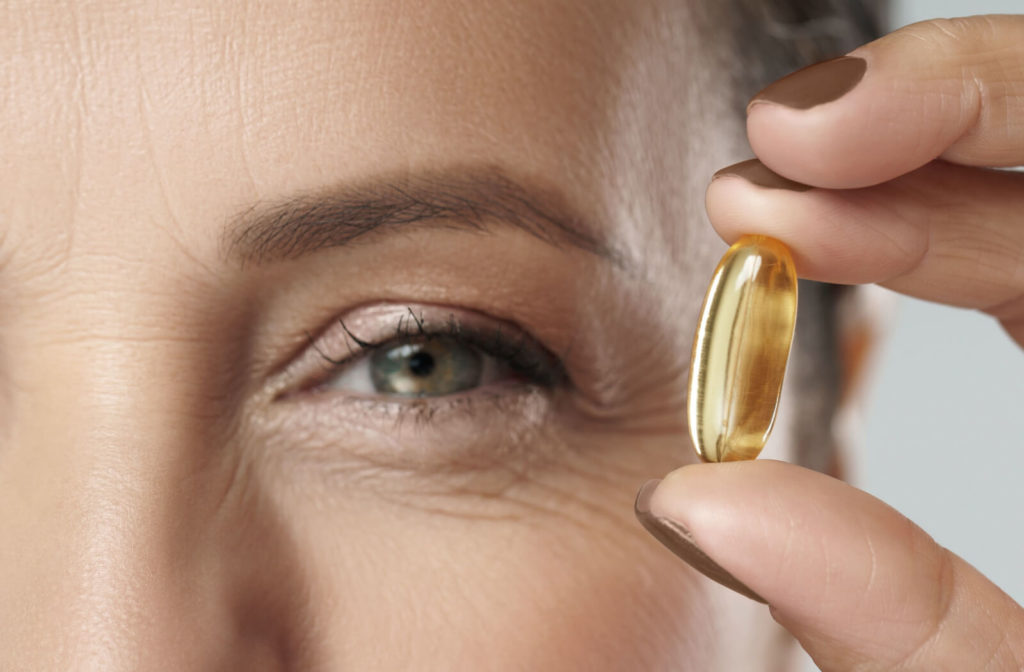Have you ever felt like your eyes were gritty? Or maybe they stung or burned? For people with dry eyes, these are familiar sensations. Eye drops can help relieve the symptoms, but you don’t have to wait for dry eyes to appear before dealing with them. Instead, be proactive!
Certain vitamins can keep your tears healthy and help moisturize your eyes, potentially stopping dry eye symptoms before they start or reducing the ones already present. Your optometrist can diagnose your dry eyes with an eye exam, as well as other potential vision issues.
What Are Dry Eyes?
Dry eyes can happen for a variety of reasons and there are two types of dry eye:
- Aqueous deficiency: You don’t make enough tears
- Evaporative: Your tears are of low quality and evaporate too fast
Evaporative dry eye is the most common type of dry eye, accounting for 90% of dry eye cases. It results from conditions affecting your tear film. This is because our tears are more than simply saline and water, and a healthy tear is made up of 3 layers of mucin, water, and oils. When we blink, our tears spread across our eyes, keeping them safe and healthy.
Some factors that could result in dry eyes include:
- Aging
- Hormonal changes
- Exposure to dry, windy, or sunny environments
- Medicines like antihistamines, oral contraceptives, or antidepressants
- Health problems such as arthritis or Sjögren’s Syndrome
- Lack of blinking
The most common culprit of dry eyes is meibomian gland dysfunction (MGD). In fact, studies show that a whopping 86% of dry eye cases are due to MGD. As you may have guessed, MGD refers to a dysfunction in the meibomian glands. These glands line your eyelids and secrete an oil called meibum, which is essential in making sure your tears don’t evaporate too fast.
Dry Eye Symptoms
While it’s easy enough to describe eyes as “dry,” it can be harder to recognize what that feels like. It’s not like having dry skin where you can see or feel it crack. Instead, you may be able to recognize dry eyes by the following symptoms:
- Stinging, burning, or grittiness
- Light sensitivity
- The feeling of something foreign in your eye
- Redness
- Trouble wearing contact lenses
You may also notice your eyes are extra watery, and yet they aren’t feeling any less dry. This is because your body makes extra tears to combat any irritation, but your tears evaporate too fast to make any difference.

What Can Vitamins Help?
Fortunately, there are vitamins that may help address dry eye symptoms. You can add nutritious foods to your diet that are rich in eye-healthy vitamins or take supplements to target any deficiencies.
Getting the right amount of vitamins in your diet is a balance, and you should consult a doctor before taking supplements since you don’t want to have too much of one vitamin to the detriment of others.
Omega-3 Fatty Acid
Omega-3 fatty acid, which you may have heard called simply fish oil, has been shown to potentially reduce inflammation from dry eyes. While omega-3s are famously found in fatty fish, such as salmon or cod, they can also be obtained from flax seeds, chia seeds, flaxseed oil, and walnuts. Without question, omega-3 fatty acids are the most effective supplement for reducing dry eye symptoms.
The average North American diet is typically lacking in omega-3, so many people supplement with fish oils or eat eggs, milk, and yogurt that’s been fortified with omega-3s. Omega-3s are normally the first choice when it comes to treating dry eye with vitamins since some studies have shown an increase in omega-3s can reduce tear evaporation rate.
Vitamin A
Vitamin A is a more common vitamin and is essential for your general health, though it truly shines in its role in maintaining your colour and low-light vision. It also helps protect the cornea (the front dome of your eye) and the conjunctiva (the thin membrane covering your eye and your eyelids).
Overall, it’s not a vitamin you’ll want to skimp on. It comes in two types, but both are important for your vision. Foods high in vitamin A include:
- Egg yolks
- Liver
- Fish
- Sweet potatoes
- Carrots
- Leafy greens
- Pumpkin
Chronic dry eye can potentially damage the eye’s tissues. Vitamin A may help keep these tissues healthy and promotes healing if they are damaged.
Vitamin D
Vitamin D can help regulate inflammation that occurs due to dry eyes, as well as other eye diseases. Some studies have shown a link between dry eye disease and a vitamin D deficiency, and while it typically won’t fix the problem on its own, it may be used in conjunction with other dry eye treatments to support ideal outcomes.
One of the main sources of vitamin D is the sun, though it doesn’t typically give us our entire daily intake, especially in Canada. Some foods, such as cod liver oil, salmon, or tuna, have a decent amount of vitamin D but not enough on their own. It’s usually suggested to get some sun, eat foods high in vitamin D, and take supplements to hit your daily allotment.
Vitamin B12
Vitamin B12 is typically known for its importance in red blood cell production, DNA formation, nerve function, and metabolism, but some studies have linked a B12 deficiency to severe dry eye disease and ocular pain.
While these studies are limited, researchers have noted that there appeared to be noticeable improvement in symptoms when patients combined vitamin B12 supplements with artificial tears.
Finding Relief from Dry Eyes
Dry eyes are no fun, and it’s better to try to prevent them if you can. Vitamins may be able to fight dry eye symptoms, but they work best with other treatment methods.Vitamins could be an important part of your dry eye management plan. If you’re wondering about your options for dry eye treatment, contact our dedicated team at Aurora 2020. We’ll be happy to help you find relief!



